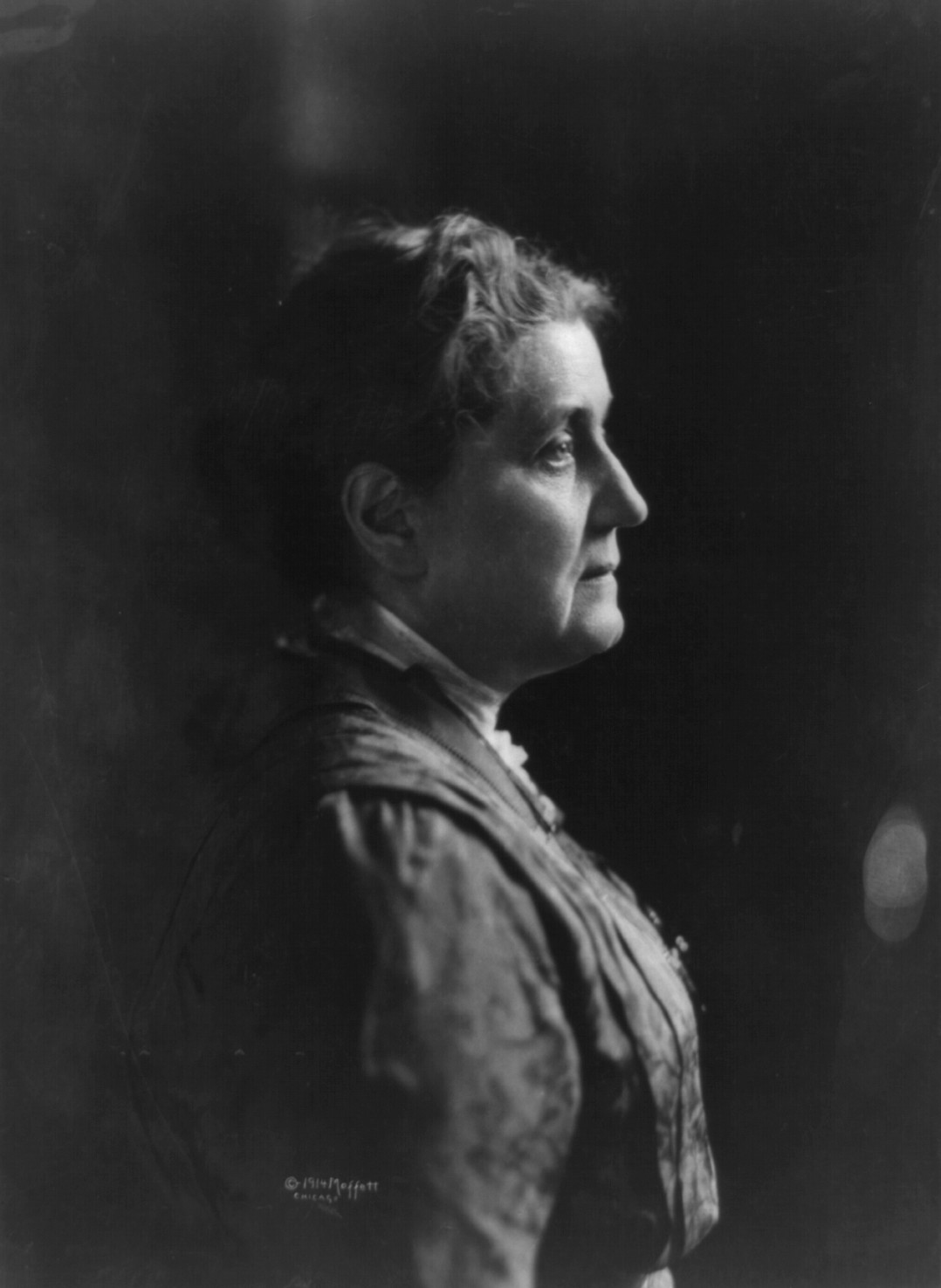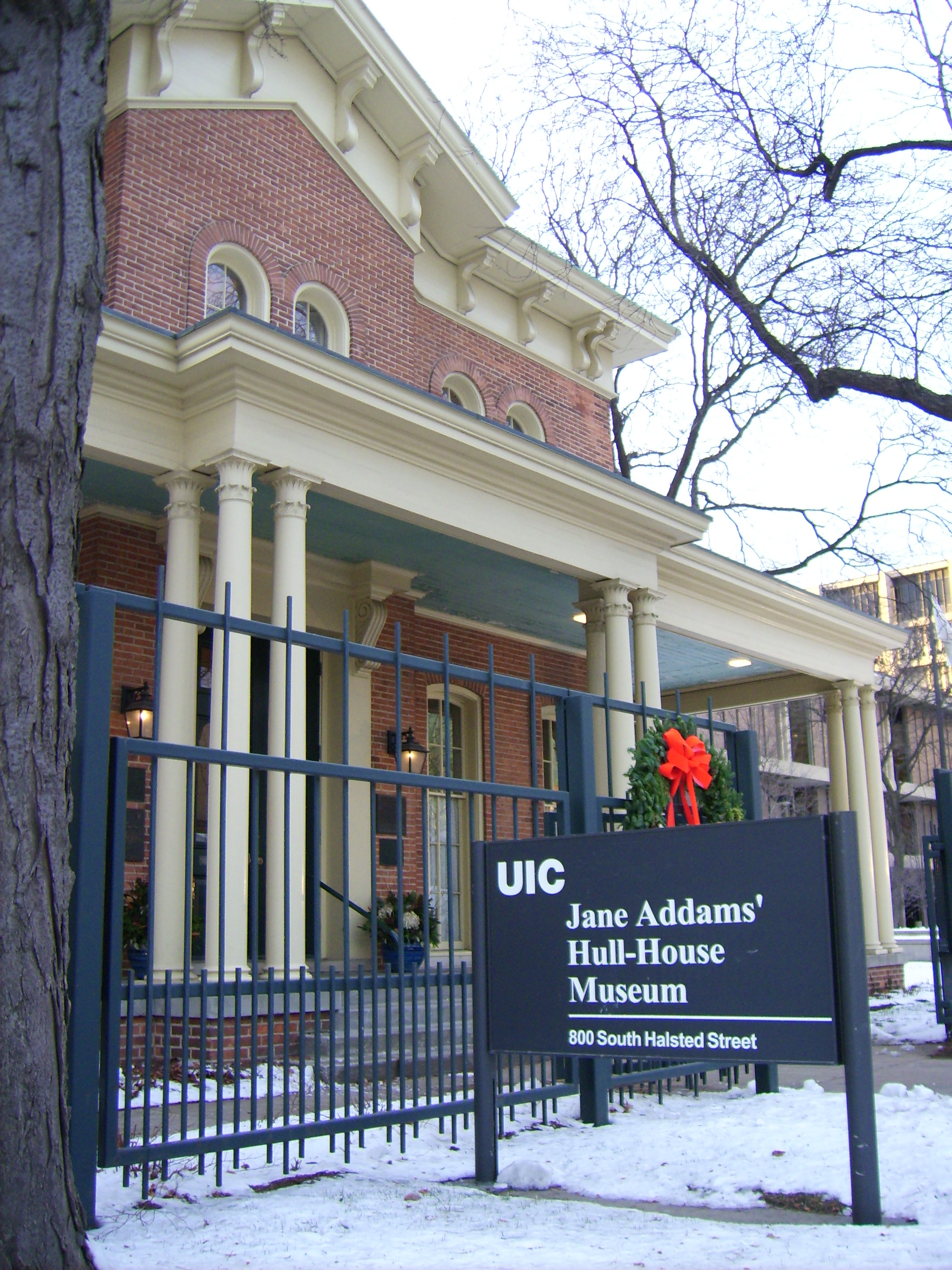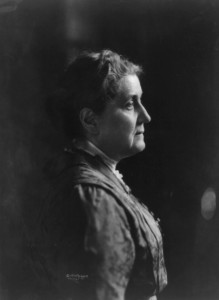Hull House
May 17, 2017Jane Addams was raised in a comfortably well-off family in a farming community. So when, as a child, she first saw that some people in the  city lived in horrible conditions she was shocked. But instead of wanting to run away, she decided that she wanted to live among those poor people.
city lived in horrible conditions she was shocked. But instead of wanting to run away, she decided that she wanted to live among those poor people.
She grew up to do more than that. In 1889 Jane Addams and her partner Ellen Starr found a big house in an area of Chicago where many recent immigrants lived, often in dirty, crowded conditions of extreme poverty. That house became Hull House, which not only provided a place for 25 women (including Addams and Starr) to live, it also served as a location for people to join clubs, discussions, and activities, as well as take English and citizenship classes, and theater, music, and art classes.
Hull House provided a kindergarten and day care for the children of working mothers, an employment bureau, an art gallery, a museum, and  libraries. Those lectures and discussions and classes were places for poor immigrants and wealthier Chicago residents to come together and learn from one another, because Addams strongly believed that people of different social classes had a great deal to teach one another, and that we all are better off when people come together.
libraries. Those lectures and discussions and classes were places for poor immigrants and wealthier Chicago residents to come together and learn from one another, because Addams strongly believed that people of different social classes had a great deal to teach one another, and that we all are better off when people come together.
Learn more by visiting The Jane Addams Hull-House Museum online.
The Hungry Coat
May 17, 2017An Invitation Song
February 1, 2016Here is a fun and lively song that’s perfect for getting excited about something new. Perhaps you could sing it in the morning, whether it’s the start of a new day–or the start of the weekend! The first verse says, “Enter, rejoice and come in!” This is a great invitation to extend to people, to ideas, and to new experiences.
What would you like to invite into your life? To whom will you extend a welcome today?
A House for All
February 1, 2016You could argue whether Jane Addams was a Unitarian, since she regularly went to a Unitarian church, but never joined. But you can’t argue about whether she understood the true meaning of hospitality.
Jane grew up in a wealthy family, but when she discovered as a child that many poor people in the cities lived in terrible conditions, she wanted to make a difference. In 1889 she and Ellen Starr founded Hull House, a big house in Chicago which offered a place for the many poor recent immigrants in the city to take part in clubs, discussions, and activities, as we ll as take English and citizenship classes, and enjoy theater, music, and art classes.
About 25 people actually lived at Hull House, and Jane made sure that both wealthier people and poor immigrants lived there together, since she believed that people with different experiences could learn a lot from each other. Jane Addams and the other women who ran Hull House with her created an amazing space of hospitality where people could learn, grow and have fun together. In 1931 she was awarded the Nobel Peace Prize.
Learning More Online:
To learn more about Hull House, and the visionary women who founded it, visit the National Women’s History Museum website. The Jane Addams-Hull House Museum today serves as a living legacy to Jane Addams and her vision of hospitality for all; learn more about their ongoing work at hullhousemuseum.org
The Fragile Art of Hospitality
February 1, 2016Podcast: Download (Duration: 13:03 — 12.0MB)
Subscribe: More
Mechthild of Magdeburg, a thirteenth-century mystic, once asked, “How shall we live?” Her answer provides a mantra of hospitality: “Be welcoming to all.” Read more →
Called to Hospitality
February 1, 2016Podcast: Download (Duration: 10:08 — 9.3MB)
Subscribe: More
 What does it mean to a Unitarian Universalist to be called to hospitality? And what or who is calling us? Read more →
What does it mean to a Unitarian Universalist to be called to hospitality? And what or who is calling us? Read more →
Welcoming What We Do Not Want
February 1, 2016Podcast: Download (Duration: 3:47 — 3.5MB)
Subscribe: More
It was a sunny spring day, and I was getting into my car in a sprawling parking lot when the phone rang. Read more →
The Guest House
February 1, 2016Podcast: Download (Duration: 0:53 — 841.1KB)
Subscribe: More
This being human is a guest house.
Every morning a new arrival. Read more →
Radical Hospitality
February 1, 2016Podcast: Download (Duration: 0:53 — 841.1KB)
Subscribe: More
Read more →Be grateful for whatever comes,because each has been sent as a guide from beyond. —Rumi
About
Quest for Meaning is a program of the Church of the Larger Fellowship (CLF).
As a Unitarian Universalist congregation with no geographical boundary, the CLF creates global spiritual community, rooted in profound love, which cultivates wonder, imagination, and the courage to act.
Contact
Church of the Larger Fellowship Unitarian Universalist (CLFUU)
24 Farnsworth Street
Boston MA 02210

